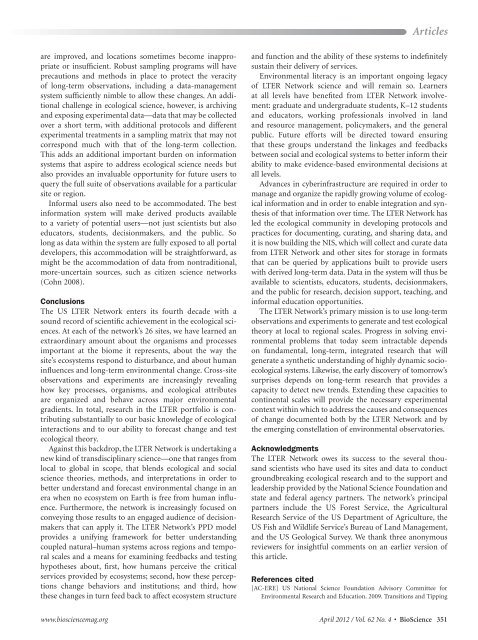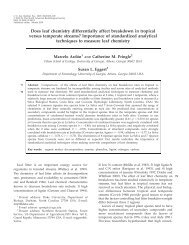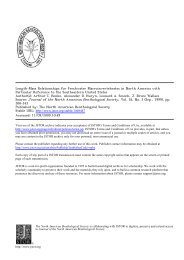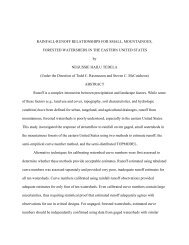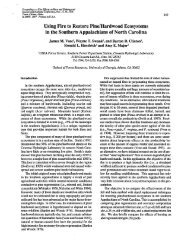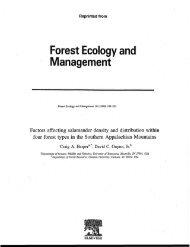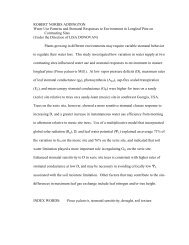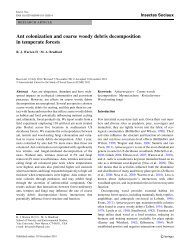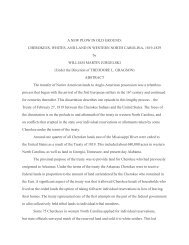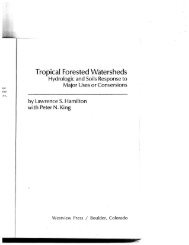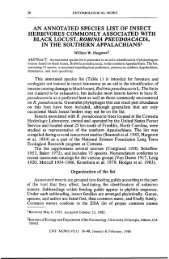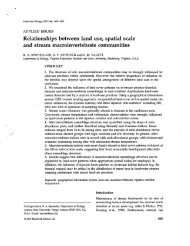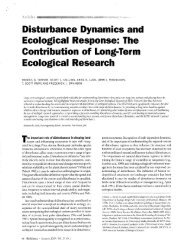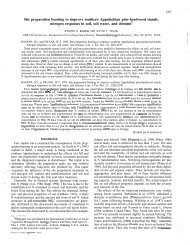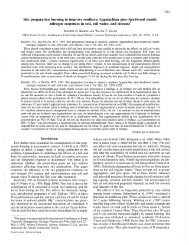biology join - Coweeta LTER - University of Georgia
biology join - Coweeta LTER - University of Georgia
biology join - Coweeta LTER - University of Georgia
You also want an ePaper? Increase the reach of your titles
YUMPU automatically turns print PDFs into web optimized ePapers that Google loves.
are improved, and locations sometimes become inappropriate<br />
or insufficient. Robust sampling programs will have<br />
precautions and methods in place to protect the veracity<br />
<strong>of</strong> long-term observations, including a data-management<br />
system sufficiently nimble to allow these changes. An additional<br />
challenge in ecological science, however, is archiving<br />
and exposing experimental data—data that may be collected<br />
over a short term, with additional protocols and different<br />
experimental treatments in a sampling matrix that may not<br />
correspond much with that <strong>of</strong> the long-term collection.<br />
This adds an additional important burden on information<br />
systems that aspire to address ecological science needs but<br />
also provides an invaluable opportunity for future users to<br />
query the full suite <strong>of</strong> observations available for a particular<br />
site or region.<br />
Informal users also need to be accommodated. The best<br />
information system will make derived products available<br />
to a variety <strong>of</strong> potential users—not just scientists but also<br />
educators, students, decisionmakers, and the public. So<br />
long as data within the system are fully exposed to all portal<br />
developers, this accommodation will be straightforward, as<br />
might be the accommodation <strong>of</strong> data from nontraditional,<br />
more-uncertain sources, such as citizen science networks<br />
(Cohn 2008).<br />
Conclusions<br />
The US <strong>LTER</strong> Network enters its fourth decade with a<br />
sound record <strong>of</strong> scientific achievement in the ecological sciences.<br />
At each <strong>of</strong> the network’s 26 sites, we have learned an<br />
extraordinary amount about the organisms and processes<br />
important at the biome it represents, about the way the<br />
site’s ecosystems respond to disturbance, and about human<br />
influences and long-term environmental change. Cross-site<br />
observations and experiments are increasingly revealing<br />
how key processes, organisms, and ecological attributes<br />
are organized and behave across major environmental<br />
gradients. In total, research in the <strong>LTER</strong> portfolio is contributing<br />
substantially to our basic knowledge <strong>of</strong> ecological<br />
interactions and to our ability to forecast change and test<br />
ecological theory.<br />
Against this backdrop, the <strong>LTER</strong> Network is undertaking a<br />
new kind <strong>of</strong> transdisciplinary science—one that ranges from<br />
local to global in scope, that blends ecological and social<br />
science theories, methods, and interpretations in order to<br />
better understand and forecast environmental change in an<br />
era when no ecosystem on Earth is free from human influence.<br />
Furthermore, the network is increasingly focused on<br />
conveying those results to an engaged audience <strong>of</strong> decisionmakers<br />
that can apply it. The <strong>LTER</strong> Network’s PPD model<br />
provides a unifying framework for better understanding<br />
coupled natural–human systems across regions and temporal<br />
scales and a means for examining feedbacks and testing<br />
hypotheses about, first, how humans perceive the critical<br />
services provided by ecosystems; second, how these perceptions<br />
change behaviors and institutions; and third, how<br />
these changes in turn feed back to affect ecosystem structure<br />
Articles<br />
and function and the ability <strong>of</strong> these systems to indefinitely<br />
sustain their delivery <strong>of</strong> services.<br />
Environmental literacy is an important ongoing legacy<br />
<strong>of</strong> <strong>LTER</strong> Network science and will remain so. Learners<br />
at all levels have benefited from <strong>LTER</strong> Network involvement:<br />
graduate and undergraduate students, K–12 students<br />
and educators, working pr<strong>of</strong>essionals involved in land<br />
and resource management, policymakers, and the general<br />
public. Future efforts will be directed toward ensuring<br />
that these groups understand the linkages and feedbacks<br />
between social and ecological systems to better inform their<br />
ability to make evidence-based environmental decisions at<br />
all levels.<br />
Advances in cyberinfrastructure are required in order to<br />
manage and organize the rapidly growing volume <strong>of</strong> ecological<br />
information and in order to enable integration and synthesis<br />
<strong>of</strong> that information over time. The <strong>LTER</strong> Network has<br />
led the ecological community in developing protocols and<br />
practices for documenting, curating, and sharing data, and<br />
it is now building the NIS, which will collect and curate data<br />
from <strong>LTER</strong> Network and other sites for storage in formats<br />
that can be queried by applications built to provide users<br />
with derived long-term data. Data in the system will thus be<br />
available to scientists, educators, students, decisionmakers,<br />
and the public for research, decision support, teaching, and<br />
informal education opportunities.<br />
The <strong>LTER</strong> Network’s primary mission is to use long-term<br />
observations and experiments to generate and test ecological<br />
theory at local to regional scales. Progress in solving environmental<br />
problems that today seem intractable depends<br />
on fundamental, long-term, integrated research that will<br />
generate a synthetic understanding <strong>of</strong> highly dynamic socioecological<br />
systems. Likewise, the early discovery <strong>of</strong> tomorrow’s<br />
surprises depends on long-term research that provides a<br />
capacity to detect new trends. Extending these capacities to<br />
continental scales will provide the necessary experimental<br />
context within which to address the causes and consequences<br />
<strong>of</strong> change documented both by the <strong>LTER</strong> Network and by<br />
the emerging constellation <strong>of</strong> environmental observatories.<br />
Acknowledgments<br />
The <strong>LTER</strong> Network owes its success to the several thousand<br />
scientists who have used its sites and data to conduct<br />
groundbreaking ecological research and to the support and<br />
leadership provided by the National Science Foundation and<br />
state and federal agency partners. The network’s principal<br />
partners include the US Forest Service, the Agricultural<br />
Research Service <strong>of</strong> the US Department <strong>of</strong> Agriculture, the<br />
US Fish and Wildlife Service’s Bureau <strong>of</strong> Land Management,<br />
and the US Geological Survey. We thank three anonymous<br />
reviewers for insightful comments on an earlier version <strong>of</strong><br />
this article.<br />
References cited<br />
[AC-ERE] US National Science Foundation Advisory Committee for<br />
Environmental Research and Education. 2009. Transitions and Tipping<br />
www.biosciencemag.org April 2012 / Vol. 62 No. 4 • BioScience 351


